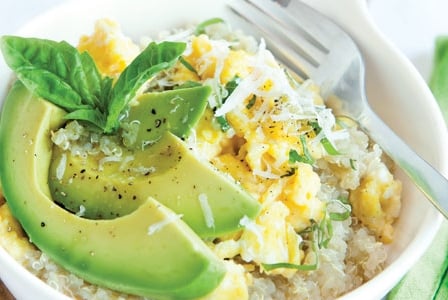
Nicknamed the \”butter pear\” due to its creamy texture and über-rich flavour – which can instinctively make you murmur \”mmm\” upon eating – you might think the avocado is a minefield of fat with little else to offer nutritionally.
Nicknamed the “butter pear” due to its creamy texture and über-rich flavour—which can instinctively make you murmur “m’mm” upon eating—you might think the avocado is a minefield of fat with little else to offer nutritionally.
Truth is, the avocado is a nutrient-dense meal unto itself, and all its fat is actually good for you.
Healthy fats
In our desire to eat lighter and healthier we may shun fat and thus overlook avocados. Although 85 percent of an avocado’s calories come from fat, it is one of the healthiest and most diverse fats you can eat. Avocado fat is loaded with phytosterols and polyhydroxylated fatty alcohol (PFA) that contain an arsenal of anti-inflammatory benefits to help prevent and relieve osteoarthritis and rheumatoid arthritis.
Over half the fat in an avocado is made up of monounsaturated fatty acids. This is a cholesterol-free wonderfat that works on many levels: provides slow-burning fuel so we stay fuller longer, helps decrease LDL (bad) cholesterol levels and raise HDL (good) cholesterol, reduces risk of strokes, and maintains good heart health.
Avocado’s oleic acid content (fatty acid) is linked to the possible prevention of breast cancer. It also acts as an enabler to better absorb fat-soluble vitamins, minerals, enzymes, antioxidants, and other nutrients eaten with it.
Impressive nutrient profile
Avocados provide approximately 20 essential nutrients including vitamins A, D, E, and K; B vitamins; and soluble and insoluble fibre. They are also a good source of plant-based protein. One avocado has 18 essential amino acids and 4 g of protein. When added to carotenoid-rich foods, avocados boost the absorption of lycopene and beta carotene.
A potassium and fibre powerhouse, one avocado contains more potassium than a banana and ounce for ounce has more fibre than most other fruit. One whole avocado contains a whopping 10 g of fibre. If an avocado had a health report card, it would look something like this: A+ for promoting a healthy heart, improving cholesterol, keeping blood pressure in check, maintaining healthy cells, preventing macular degeneration, and hydrating skin to keep it soft and supple.
Choosing, ripening, and storing
While there are over 500 types of avocados, the two we typically find in the grocery stores are Haas and Fuerte. Choose dark, shiny avocados, and avoid ones with cracks and soft sunken spots. Choose ones that have a small pinched neck (versus just round) at the top. This means they were picked when ripe—so the flavour will be better.
To test for ripeness, give them a gentle squeeze—they should yield slightly but not be overly soft. If avocados are firm, store at room temperature and speed ripening by placing in a paper bag with a banana. Once ripe, eat right away or refrigerate until ready to use.
Avocados are a highly nutritious and delicious superfood. Try one today—scooped right from the shell for a satiating snack or added to your salads and sandwiches for a nutrient boost.
Recipes
- Quinoa and Avocado Scram Slam
- Smashed Avocado Toasts
- Brazilian Avocado Smoothie
- Salmon, Butter Leaf, and Avocado Salad

